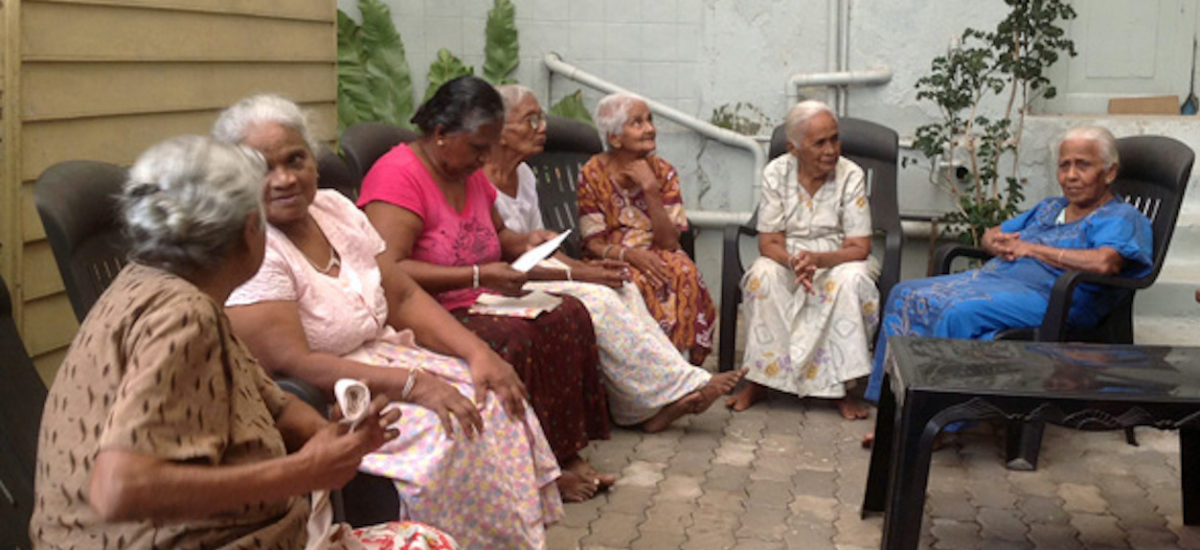Photo courtesy of Newsin.Asia
Today is International Day of Older Persons
The world is ageing fast. Today there are 703 million people aged 65 or older; by 2050 the number will rise to 1.5 billion. According to population estimates and projections from UN Department of Economic and Social Affairs’s Population Division, 1 in 6 people in the world will be over 65 by 2050, up from 1 in 11 in 2019. The number of people aged 80 or over will triple in the next 30 years while global life expectancy beyond 65 will increase by 19 years.
With longer lives comes a host of mental and physical ailments associated with ageing. As anyone who is facing the prospect of old age knows, the most important aspect is the quality of your life rather than the number of years you can live. Most people either lose their physical abilities or their mental faculties; it is a rare person that manages to retain them both.
While physical decay is daunting, mental degeneration is terrifying. Forgetting where your glasses are or stumbling over a name can be attributed to the natural progression of old age but if you put the frying pan in the freezer, dementia has probably set in.
Dementia is an umbrella term used to describe a decline in cognitive functioning such as thinking, remembering, reasoning and the ability to perform everyday activities. Alzheimer’s disease is the commonest cause of dementia, accounting for about 60 percent of cases. Dementia can also be caused by other factors such as a head injury, a stroke, a brain tumour, Parkinson’s disease, AIDS and excessive alcohol use. Its greatest risk factor is age, which is significant in Sri Lanka because the number of peopleover 60 is escalating and will reach 25% of the population by 2041.
Worldwide, around 55 million people have dementia with over 60% living in low and middle income countries. As the proportion of older people in the population is increasing in nearly every country, this number is expected to rise to 139 million in 2050. In Sri Lanka, by 2050, 460,000 people are projected to have dementia.
“People with dementia have particular problems with their short term memory. They consistently forget things that they have just said or done, even though they can often recall clearly events that happened many years ago. Their sense of time and place is typically lost. They may develop problems with finding words and it becomes increasingly difficult of them to learn new information and to do new things. As time goes on, people with dementia need help to perform even the most basic tasks of everyday living, including washing, dressing and eating,” according to the Lanka Alzheimer’s Foundation (LAF).
“Eventually, people with dementia may become uncommunicative and incontinent. Sometimes there are severe behavioural problems. Most people with dementia eventually require 24 hour care. Dementia often go on for many years – even 20 – and is not usually the actual cause of death.”
Dementia is not a well-known disease in Sri Lanka although there is much more awareness and acceptance than some years ago. LAF has been in the forefront of the fight to recognize and accept dementia in Sri Lanka. Set up in 2001 by the tireless persistence of its founder Lorraine Yu, the Foundation now boasts a state of the art centre where people come to socialize and be occupied. “Awareness on dementia is certainly better but there is still a long way to go. People are more open to seek help and the stigma surrounding it is gradually declining,” said LAF’s new president Dr. Shehan Williams, who took over from Ms. Yu in 2019.
Still very much a condition more familiar to urban people, there is a concerted effort to take awareness to rural areas. “LAF is developing a strategic plan for the next five years where we will be reaching out to the districts, working at the ground level mobilising elders and women’s societies. We hope these community level interventions will bring greater awareness and more local action to promote healthy lifestyles, prevent dementia and provide partnerships to identify and support persons with dementia and their families,” Dr. Williams explained. “The time has come now for us to move out to all the corners of the country and develop Dementia Friendly Communities island wide that will prevent dementia and support persons with dementia and their carers.”
A new spectre in the form of Covid-19 has come to haunt dementia patients, where every fifth person dying of the virus in the western world where studies are conducted, are those with dementia. “The pandemic has been devastating for persons with dementia and their carers. Social isolation due confinement to their homes and limited contact with their family and friends has resulted in a very apparent decline in all those affected by the condition. The family carers are struggling as many persons with dementia develop what is known as Behavioural and Psychological Symptoms of Dementia (BPSD), which can be more challenging than the forgetfulness that is commonly expected. Those with dementia are unable to understand they have to remain indoors or as to why their children and grandchildren are not visiting them and can become very restless, agitated, abusive and even aggressive,” said Dr. Williams.
With Sri Lanka’s ageing population, the government has a daunting task ahead to cope with the growing numbers of dementia patients. “Dementia is a silent epidemic and will need a concerted effort to overcome the challenges. Sri Lanka is signatory to WHOs initiatives on dementia, including a commitment to developing a national dementia action plan.
“I think that it is clear now with the Covid pandemic that every Sri Lankan has to take responsibility for their own health and reduce the burden on the system by living wisely. I believe that the responsibility for health cannot be carried by the health services alone and communities have to take ownership for their wellbeing. We have to develop novel approaches in community mobilisation which will eventually pay off in terms of better health with minimal expenses to the government,” Dr. Williams maintained.
Dementia is a disease with no cure. Medication can help to slow the process but will not reverse the gradual deterioration.
“Remaining physically and mentally active is one sure way of delaying the onset of dementia and slowing down the decline if one were to get dementia. This has to go hand in hand with making sure that conditions such as diabetes mellitus and high blood pressure are identified and treated optimally. The importance of adequate sleep and healthy eating cannot be overemphasized. Social interaction, music, mental activities in the form of Sudoko, scrabble, painting, stitching, engaging with the computer and even learning a new language can help the brain remain active and form new connections within itself to optimise its function. ‘You use it or you lose it’, literally,” Dr. Williams concluded.
“In the midst of winter, I finally found there was within me an invincible summer.” Albert Camus


